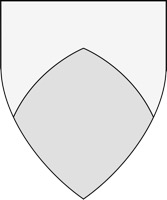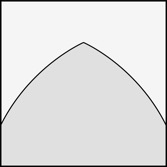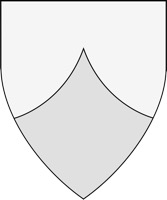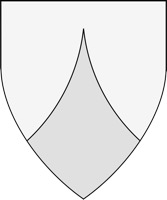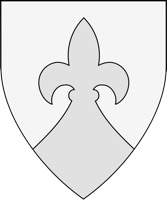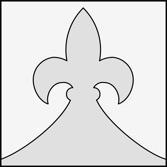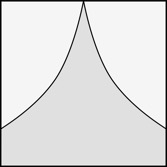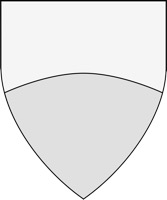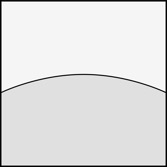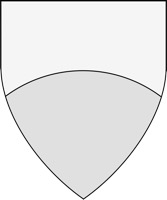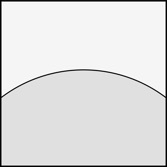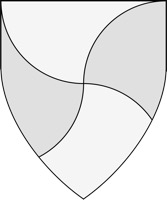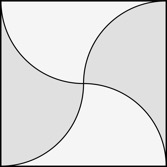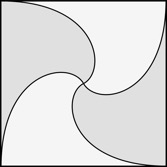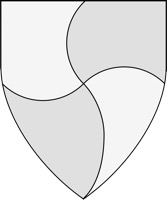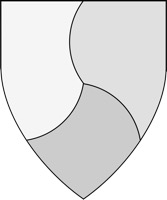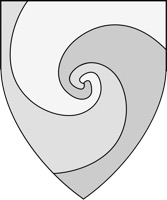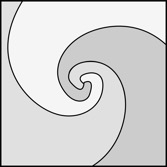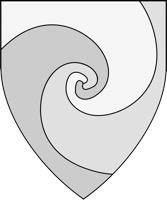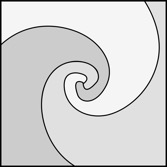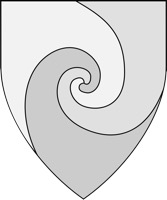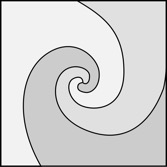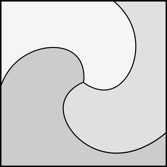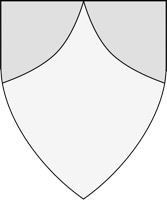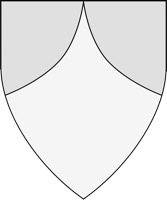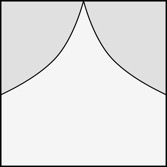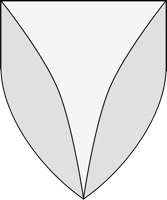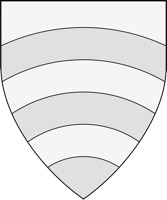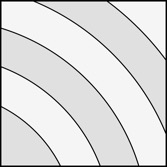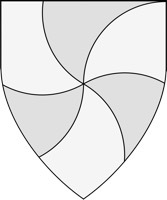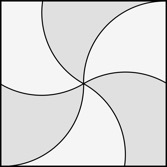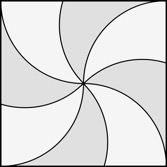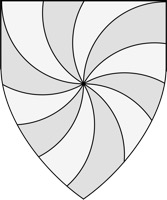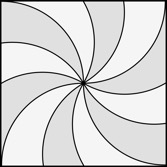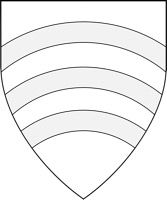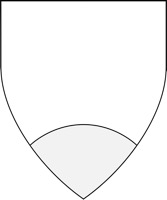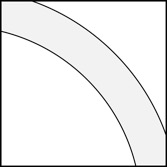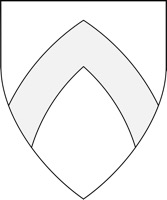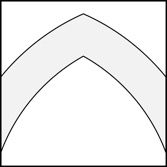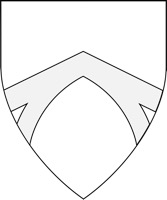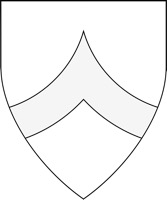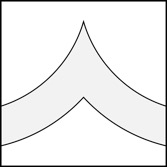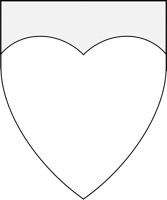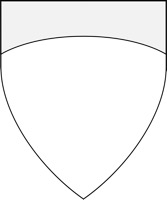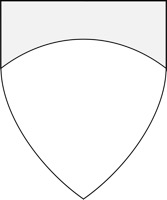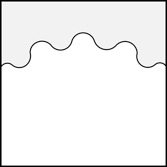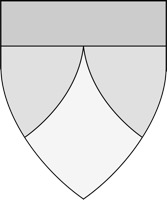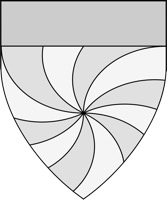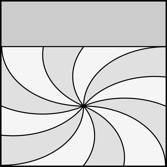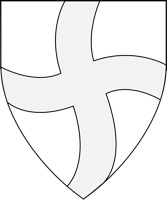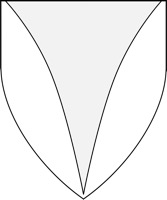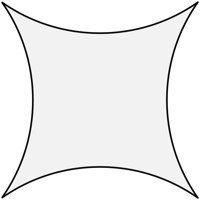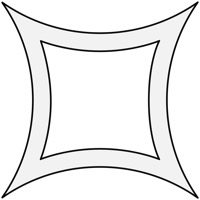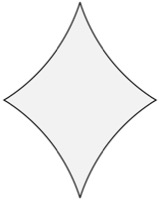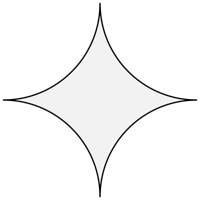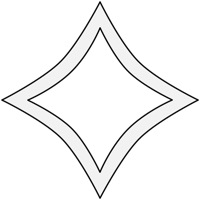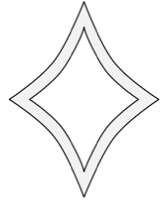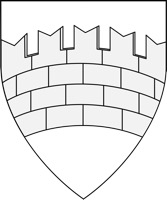60 Entries • Display: Details | Items • Item Shape: Device | Badge
Curved Line §
Curved lines are used for divisions or ordinaries which are enarched, embowed, arrondi, or ployé.
Per Chevron Ployé (1) §
Equal field division. May use any two tinctures.
Must issue from sides of device. Must be centered on the fess line. Angle may be narrower or wider than 90°.
Per Chevron Ployé (2) §
Equal field division.
Source: Viking Answer Lady SVG Images For Heralds. Artist: Gunnvôr silfrahárr. Adapted by Mathghamhain Ua Ruadháin.
Per Chevron Ployé Flory at the Point (1) §
Equal field division. May use any two tinctures, except sable and purpure or sable and azure.
Must issue from sides of device. Must be centered on the fess line. Angle may be narrower or wider than 90°.
Artist: Vémundr Syvursson.
Per Chevron Ployé Flory at the Point (2) §
Equal field division. May use any two tinctures, except sable and purpure or sable and azure.
Must issue from sides of device. Must be centered on the fess line. Angle may be narrower or wider than 90°.
Artist: Vémundr Syvursson.
Per Chevron Throughout Ployé §
Equal field division. May use any two tinctures.
Issues from near lower corners of device and reaches the center chief.
Per Fess Enarched (1) §
Equal field division. May use any two tinctures.
Enarched is treated as a division per fess with a complex line, although for conflict checking it is considered equivalent to a plain division per fess.
Per Fess Enarched (2) §
Equal field division.
Source: Viking Answer Lady SVG Images For Heralds. Artist: Gunnvôr silfrahárr. Adapted by Mathghamhain Ua Ruadháin.
Per Saltire Arrondi (2) §
Equal field division. May use any two tinctures.
Source: Wappenbuch der Arlberg-Bruderschaft. Artist: Vigil Raber. (Page 94.)
Per Pall Arrondi §
Threefold field division. One tincture must have good contrast with its neighbors.
Per Pall Inverted Arrondi §
Threefold field division. One tincture must have good contrast with its neighbors.
Gyronny of 3 Arrondi (1) §
Threefold field division. One tincture must have good contrast with its neighbors.
Similar to “per pall arrondi,” sometimes blazoned “tierced in gyrons arrondi,” or in German “Schneckendreipass” (snail-three-parted).
Source: Siebmacher’s Wappenbuch of 1605. Artist: Johann Siebmacher.
Gyronny of 3 Arrondi (2) §
Threefold field division. One tincture must have good contrast with its neighbors.
Similar to “per pall arrondi,” sometimes blazoned “tierced in gyrons arrondi,” or in German “Schneckendreipass” (snail-three-parted).
Source: Siebmacher’s Wappenbuch of 1605. Artist: Johann Siebmacher.
Gyronny of 3 Arrondi (3) §
Threefold field division. One tincture must have good contrast with its neighbors.
Similar to “per pall arrondi,” sometimes blazoned “tierced in gyrons arrondi,” or in German “Schneckendreipass” (snail-three-parted).
Source: Stuttgarter Schiessen. Artist unknown. (Folio 95r.)
Gyronny of 3 Arrondi (4) §
Threefold field division. One tincture must have good contrast with its neighbors.
Similar to “per pall arrondi,” sometimes blazoned “tierced in gyrons arrondi,” or in German “Schneckendreipass” (snail-three-parted).
Source: A System of Heraldry. Artist unknown. (Page 20.)
Chapé Ployé (1) §
Unequal field division. May use any two tinctures, following a November 2022 ruling.
The central area is blazoned first, then the corners, as “tincture chapé tincture.”
Term is French, suggesting the upper corners are “cloaked” or “mantled.”
Corners are typically not charged. Issues from sides of device and reaches the center chief.
Chapé Ployé (2) §
Unequal field division. May use any two tinctures, following a November 2022 ruling.
The central area is blazoned first, then the corners, as “tincture chapé tincture.”
Term is French, suggesting the upper corners are “cloaked” or “mantled.”
Corners are typically not charged. Issues from sides of device and reaches the center chief.
Chaussé Ployé §
Unequal field division. Must use two contrasting tinctures.
The central area is blazoned first, then the corners, as “tincture chaussé ployé tincture.” Term is
French, suggesting the lower corners are “shod.” Corners are typically not charged. Issues from chief corners of device and reaches the center base. Similar to a pile throughout, but stretches the full width of the chief and is treated as a field division rather than a charge.
Vêtu Ployé §
Unequal field division. Must use two contrasting tinctures.
The central area is blazoned first, then the corners, as “tincture vêtu tincture.” Term is French, suggesting the corners are “vested.” Corners are typically not charged. Issues from sides of device and reaches the center chief and center base. Similar to a lozenge ployé throughout, but is treated as a field division rather than a charge.
Barry Enarched §
Equal field division. Must use two contrasting tinctures.
Source: Wappenbuch des Heiligen Römischen Reiches. Artist unknown. (Page 710.)
Bendy Enarched §
Equal field division. Must use two contrasting tinctures.
Source: Bergshammars Vapenbok. Artist unknown. (Page 127.)
Gyronny Arrondi of 6 §
Multi-part field division. Must use two contrasting tinctures.
If curves face in the other direction, blazoned “gyronny arrondi widdershins.”
Gyronny Arrondi (of 8) §
Multi-part field division. Must use two contrasting tinctures.
If curves face in the other direction, blazoned “gyronny arrondi widdershins.”
Gyronny Arrondi of 12 §
Multi-part field division. Must use two contrasting tinctures.
If curves face in the other direction, blazoned “gyronny arrondi widdershins.”
Gyronny Arrondi of 12 (Widdershins) §
Multi-part field division. Must use two contrasting tinctures.
Gyronny Arrondi of 16 §
Multi-part field division. Must use two contrasting tinctures.
If curves face in the other direction, blazoned “gyronny arrondi widdershins.”
Gyronny Arrondi of 16 (Widdershins) §
Multi-part field division. Must use two contrasting tinctures.
Three Bars Enarched §
Central ordinary.
Source: Wapenboek van Gent. Artist: Vander Schelden. (Volume 1, page 27.)
Base Enarched Indented §
Peripheral ordinary.
Source: Viking Answer Lady SVG Images For Heralds. Artist: Gunnvôr silfrahárr.
Chevron Enarched Conjoined To A Chevron §
Central ordinary.
Source: The Accedence of Armorie. Artist unknown. (Folio 105v.)
Chief Doubly Enarched §
Peripheral ordinary.
Considered a step from core practice (SFCP)
as of the Dec 2011 LoAR.
Chief Enarched (2) §
Peripheral ordinary.
Source: Viking Answer Lady SVG Images For Heralds. Artist: Gunnvôr silfrahárr. Adapted by Mathghamhain Ua Ruadháin.
Chief Enarched Wavy §
Peripheral ordinary.
Source: Viking Answer Lady SVG Images For Heralds. Artist: Gunnvôr silfrahárr.
Gyronny Arrondi And A Chief §
Peripheral ordinary and field division.
When a gyronny field is combined with a chief, the gyronny’s center shifts downwards.
Gyronny Arrondi of 12 And A Chief §
Peripheral ordinary and field division.
When a gyronny field is combined with a chief, the gyronny’s center shifts downwards.
Delf Ployé §
A block of dirt. Drawn as a square.
Default orientation: flat side to base. No proper coloration.
Delf Ployé Voided §
A block of dirt. Drawn as a square.
Default orientation: flat side to base. No proper coloration.
Lozenge Ployé (1) §
A diamond shape.
Default orientation: one point to chief.
The term “ployé” indicates that the sides are curved in.
Lozenge Ployé (2) §
A diamond shape.
Default orientation: one point to chief.
The term “ployé” indicates that the sides are curved in.
Lozenge Ployé (3) §
A diamond shape.
Default orientation: one point to chief.
The term “ployé” indicates that the sides are curved in.
Mascle Ployé (1) §
A diamond voided.
Default orientation: one point to chief.
The term ploye describes a shape with curved sides.
Source: Pennsic Traceable Art. Artist: Roana d’Evreux.
Mascle Ployé (2) §
A diamond voided.
Default orientation: one point to chief.
The term ploye describes a shape with curved sides.
Wall Enarched §
A barrier of stone.
Default orientation: fesswise throughout. Proper coloration: gray or argent stone.
Source: Scheibler Armorial. Artist: Unknown. (From the arms of von Weineckh.) Adapted by Mathghamhain Ua Ruadháin.


